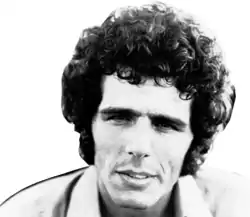Bobby Bloom
Robert Bloom (January 15, 1946[1] – February 28, 1974) was an American[1] singer-songwriter. He is known best for being a one-hit wonder with the 1970 song, "Montego Bay", which was co-written with and produced by Jeff Barry.
Bobby Bloom | |
|---|---|
 Bobby Bloom in 1970 | |
| Background information | |
| Birth name | Robert Bloom |
| Born | January 15, 1946 Brooklyn, New York City, U.S. |
| Died | February 28, 1974 (aged 28) Hollywood, California, U.S. |
| Genres | Pop, calypso, rock |
| Occupation(s) | Musician, singer-songwriter |
| Instruments | Vocals |
| Years active | Early 1960s–1974 |
| Labels | Polydor Buddah Kama Sutra L&R |
Biography
Bloom was born in Brooklyn, New York City. In the early 1960s, while still in his teens, Bloom had been a member of the doo-wop group, The Imaginations.[2][3] He received a big break in 1969 when he was awarded a contract to write and record a jingle for Pepsi, paving the way for his later success with "Montego Bay." He also played a role as a songwriter for the Kama Sutra/Buddah group of labels,[4] co-writing "Mony Mony" for Tommy James and the Shondells and, with Jeff Barry, "Sunshine" for The Archies.[4] Bloom co-wrote songs with Jeff Barry and Neil Goldberg for the Monkees' album Changes and their 1971 single "Do It in the Name of Love". He often recorded demos of his songs at the recording studio of MAP City Records, owned by friends Peter Anders and Vincent "Vini" Poncia Jr., with chief engineer Peter H. Rosen[5] at the controls. Early solo projects included "Love Don't Let Me Down" and "Count on Me."[4]
The recordings that followed his success with "Montego Bay" in 1970, "Heavy Makes You Happy," which became a hit for the Staple Singers in 1971, "Where Are We Going" and The Bobby Bloom Album all used the same combination of pop, calypso, and rock.[4]
Death
Having suffered from depression towards the end of his life, Bloom died on February 28, 1974, in an accidental shooting at his home in Hollywood, at the age of 28.[4]
Bloom had accidentally shot himself while cleaning his gun. The surviving members of Bloom's family did not believe Bloom would have shot himself, and the investigation never followed up on leads.[6] Jeff Barry learned later he was the sole beneficiary of Bloom's life insurance policy.[7]
Discography
Singles
| Year | Title | Label | Charts |
|---|---|---|---|
| 1965 | "I Still Remember" | Kapp | [9] |
| 1967 | "Love, Don't Let Me Down" | Kama Sutra | |
| "Count On Me" | |||
| 1968 | "All I Wanna Do is Dance" | White Whale | |
| 1969 | " Jill" | Buddah | |
| "Turn On" | |||
| "Sign of the V" | Earth | ||
| 1970 | "Montego Bay" | L&R | US No. 8 UK No. 3 AUS No. 9 |
| "Make Me Happy" | MGM | US No. 80 | |
| 1971 | "Where Are We Going" | Roulette | US No. 84 |
| "Heavy Makes You Happy" | MGM | UK No. 31 | |
| "We're All Goin' Home" | US No. 93 | ||
| "We Need Each Other" | |||
| "(It's) Emergency" | Map City | ||
| 1972 | "I Really Got It Bad for You" | MGM | |
| "Sha La Boom Boom" | |||
| 1973 | "Island" | [10][11][12][1] | |
References
- Roberts, David (2006). British Hit Singles & Albums (19th ed.). London: Guinness World Records Limited. p. 64. ISBN 1-904994-10-5.
- Whitburn, Joel (2003). Top Pop Singles 1955–2002 (1st ed.). Menomonee Falls, Wisconsin: Record Research Inc. p. 66. ISBN 0-89820-155-1.
- Encyclopedia of Pop Music Aliases, 1950-2000, By Bob Leszczak - Page 33 BOBBY BLOOM
- Proefrock, Stacia. "Bobby Bloom: Artist Biography". AllMusic. Retrieved March 9, 2015.
- "The History of Creativity Cafe and V.A.R.I.O.U.S." Creativity.net. Retrieved August 9, 2017.
- Jeremy Simmonds (2008). The Encyclopedia of Dead Rock Stars: Heroin, Handguns, and Ham Sandwiches. Chicago Review Press. ISBN 978-1556527548. Retrieved January 30, 2011.
- "Archived copy". Archived from the original on May 22, 2008. Retrieved July 21, 2008.CS1 maint: archived copy as title (link)
- Discogs – Bobby Bloom, Discography, Albums
- Global Dog Productions – 45 Discography for Kapp Records
- Global Dog Productions – 45 Discography for M-G-M Records – 14000 series
- 45Cat – Bobby Bloom – Discography, USA
- Discogs – Bobby Bloom, Releases, Singles & EPs
